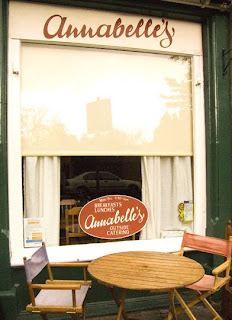RIP Social Comedy?
A couple of years ago I went to a tea party at the lovely Annabelle's cafe in Edinburgh, organised by Persephone Books. It was a most enjoyable afternoon - we had tea, scones and jam and tiny meringues filled with cream, and our speaker was Fiona Bevan, the great-granddaughter of the writer DE Stevenson. Fiona told us the fascinating story of her great-grandmother, the author of novels including Miss Buncle's Book
and the Mrs Tim series. It seems that Dorothy, an army officer's wife and mother of four, eventually became something of sophisticate - Fiona remembered being taken to visit a grand and slightly intimidating old lady, who reclined on a chaise longue, cigarette holder in hand. It is this image that has stayed with me, and which inspired the name of this blog.
Some of my favourite writers date from the same era as DE Stevenson. Barbara Pym, Angela Thirkell, RC Sherriff, Elizabeth Taylor and RC Sherriff come to mind, although not all of their novels could be categorised as 'social comedy' - Macaulay's Towers of Trebizond is, in particular, hilarious in parts but with a deep undercurrent of sadness and regret. What I see in all of these authors, however, is the ability to observe social customs and sillinesses, and turn these into entertaining literature, and I do wonder if that is still possible today.
Stevenson's Miss Buncle's Book, for example, relies on a central concept that none of the self-absorbed, social climbing, inhabitants of her village will recognise themselves in the novel she writes to make ends meet - whereas now, few people in a village (despite what the Archers would have us believe) know each other well enough to bother about maintaining their position in the social milieu. All of Barbara Pym's early works - Excellent Women, Some Tame Gazelle, A Glass of Blessings - rely on social constructs that no longer exist; in each, the Church of England plays a pivotal part - everyone attends it, curates are eagerly awaited and pounced upon by middle aged spinsters, church whist drives, youth clubs and outings provide numerous opportunities for interaction, and most of the middle class live leisurely lives funded by private incomes. If anyone steps put of place, they are soon returned to it: here is a scene from Excellent Women in which the jumble sale helpers discuss Italian men - a subject that none of them, incidentally, has any experience of:
'"The Italians are very forward with women" declared Miss Statham..
"Pinch your bottom they would before you could say knife" burst out Mrs Morris, but the short silence that followed told her that she had gone too far. Strictly speaking, she was socially inferior to ....Miss Statham; it was only her participation in parish activities that gave her a temporary equality.'
I can't imagine an equivalent situation arising now - the world has changed, and in doing so, the material of gentle social comedy has perhaps been lost - if no-one is expected to behave in certain ways, it is surely much harder to make their behaviour comic? Or is it? Are there contemporary novels that highlight modern manners?




That sounds like an interesting tea party. I used to go to a church like the one you spoke about when I was young. The snobbery and protocol was awful.
ReplyDelete